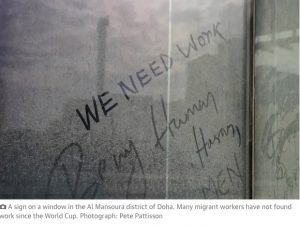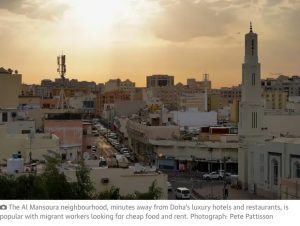Qatar has faced severe criticism for the abusive conditions endured by many low paid workers in the country. Photograph: Pete Pattisson
Visa scams and a collapsed job market mean that 100 days on from the World Cup final, many workers face destitution despite promises of rights reforms
Migrant workers from west Africa say they have been left stranded, destitute and jobless in Qatar just 100 days after the end of the World Cup, despite claims that the tournament would leave a legacy of better workers’ rights in the country.
The Guardian has interviewed men with so-called “free visas”, under which they must find their own jobs, who say they have been out of work for months. Some can barely afford to eat. Others are so short of money they have been forced to plead for help from their impoverished families back home.
“I haven’t eaten for two days,” says Aboubacar*, from Guinea, who has not worked since the World Cup. “Ironic, isn’t it?” says another. “We are in the richest country in the world, but we are begging for money from Africa.”
The Guardian spoke to other workers from Nigeria who have been duped into paying vast sums to enter Qatar on Hayya cards, the permit required to visit the country during the World Cup.
They are falsely promised by rogue recruitment agents in their own country that Hayya cards can be converted into work visas on arrival. The validity of the card was recently extended until 2024 but it can be used only for tourism, leaving the victims deep in debt, unable to legally work and struggling to return home.

Qatar has faced severe criticism for the abusive conditions endured by many low-paid workers in the country, including wage theft, illegal recruitment fees and injuries and death while building stadiums and infrastructure.
The Qatari authorities and Fifa repeatedly promised the tournament would be a catalyst for change, with the Fifa president Gianni Infantino calling Qatar’s progress on workers’ rights “incredible”, but the reality suggests migrant workers continue to endure harsh living and working conditions.
Warnings from the Nigerian embassy in Doha about the misuse of the Hayya card did not reach men such as Hakeem, who sold all his belongings, including his car, to raise almost 2m naira (£3,556) to pay an agent who provided him with a card and the promise of a job when he reached Doha. Instead, Hakeem says, he “used me and dumped me here”.
“I used to eat three square meals at home but here it’s difficult to get one. I have been calling friends in Nigeria to help me. I have not earned a single rial since I entered the country. We’re all regretting coming here,” he says.
Workers on “free visas” enter the country on a work visa under a local sponsor, but must find their own jobs. The scheme is illegal but highly lucrative for the sponsors who secure the visas and for agents in labour-sending countries who sell them on to young men desperate for work.
Many of the affected workers appear to come from west Africa – particularly Ghana, Nigeria, Sierra Leone, Guinea and Niger – and all arrived in debt having paid huge fees for the visas.
“Free visas” give workers the flexibility to choose their own jobs and negotiate higher wages, but they also leave them in a more precarious position. Many were already struggling in the run-up to the World Cup when most large construction projects were put on hold, but since the tournament ended the job market appears to have collapsed.
“There is genuinely no work here now. No one is recruiting. There’s only so many highways and roads that they need,” says a source with years of experience in Qatar’s construction sector.
Many find themselves trapped; unable to survive without work but reluctant to return home before they have paid off their debts. Some workers have fallen foul of Qatar’s immigration rules, often because they cannot afford to renew their visa or pay for an ID card, which is required to work legally, and so live under the constant threat of arrest and deportation.
In the Al Mansoura neighbourhood, a short drive from the luxury hotels and shops of central Doha, rundown old apartment blocks are packed with low-wage workers. On the top floor of one block, Ahmad shares a tiny room with nine others. They sleep in four bunk beds packed into the room. Two more sleep on mattresses on the floor. A few packets of kaboos – flat breads similar to pitta – lie on the floor. “That’s what we mostly eat. Kaboos and plain rice,” he says.

Ahmad arrived in Qatar from Nigeria with three friends using Hayya cards arranged by an agent. They borrowed money from friends and family to pay the eye-watering sum for the promise of a job; 1.1m naira upfront with a further 600,000 naira (£1,070) due when they started earning.
The agent had assured Ahmad that he could convert the card into a work visa on arrival, but by the time he realised that was a lie, it was too late. “I want to go home, but I don’t want to go home,” says Ahmad. “The money I owe is keeping me here. I don’t need anything for myself. I just need to be able to settle my debts.”
Without the proper documentation, it is almost impossible to find a job. “No one will allow us to work. Even those with a visa are not working. People from home are sending me money for rent and food. I came here to help them, but they are helping me,” he says.
Qatar’s international media office said it is illegal for companies in Qatar to charge recruitment fees and the government works closely with the business community to ensure compliance. To reduce the risk of fees being charged, Qatar has opened 14 visa centres in labour-sending countries. Free visas are also illegal, and when notified, the government punishes recruitment agencies or sponsors involved in the scheme.
“Workers who entered Qatar on free visas and are facing difficulty are encouraged to seek immediate assistance from the Ministry of Labour to resolve their situation,” added a spokesperson.
In the two months after the World Cup final, more than 50,000 workers successfully changed jobs, according to the spokesperson for Qatar’s international media office.
“The legacy of the 2022 World Cup on Qatar’s labour market is clear for all to see. Hundreds of thousands of workers have benefited from the reforms, such as the removal of exit permits and the freedom to change jobs, the introduction of the region’s first non-discriminatory minimum wage, improved health and safety standards, and better access to justice,” the spokesperson said.
* Some names have been changed
